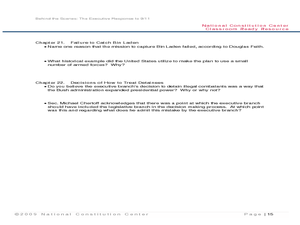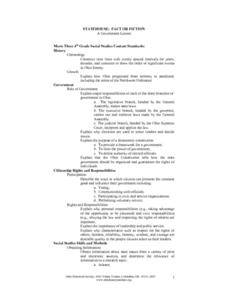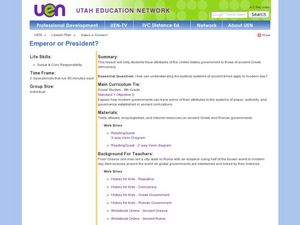Reading Through History
The Federalist Papers: Federalist Paper No. 51
How did Federalists feel about the federal government? Learners search for the answers in the Federalist Paper No. 51, which discusses the powers of the presidency. Then, they answer various questions to test for their comprehension of...
School District of Detroit
The Articles of the Confederation
Primary historical sources can be a challenge for some readers, so these seven guided-reading questions will be very useful to US History or Government classes studying The Articles of Confederation. Each question has multiple parts and...
Curated OER
Reconstruction (1865-1876)
Easily broken into pieces for several class sessions, this presentation is a great way to transition your class out of a Civil War unit and closer to the 20th century. Engaging photographs, including relevant maps and humorous political...
USA.gov
How The Supreme Court Works
Just how does a case come before the highest court in the land? A graphic flow chart unpacks how plaintiffs come before the Supreme Court. Graphics include background on the nine justices and just how many cases they actually hear each...
Curated OER
Utah Executive System
Fifth graders demonstrate their knowledge about the main duties of the executive branch of the government through a numbered heads activity and by correctly completing a worksheet given them.
Curated OER
The Power of an MP versus Their Loyalties to the Cabinet and Caucus
Pupils analyze the benefits and drawbacks that the government MP faces belonging to a party caucus and their association with a powerful executive in the cabinet.
Curated OER
Behind the Scenes: The Executive Response to 9/11
Students examine the actions of the executive branch following the September 11th terrorist attacks. In this U.S. government lesson, students watch segments of a video titled "Behind the Scenes: The Executive Response to 9/11." Students...
Curated OER
Science Under Control
Pupils investigate and assess scientific issues for which government regulation has been or might be enacted. Using their research, students write letters to lawmakers supporting or contesting related legislative efforts.
Curated OER
Just how broken is the Senate?
Twelfth graders examine the role of the Senate in the United States. In this American Government lesson plan, 12th graders read various articles and answer questions to these articles. Students write a letter to their Senator on a...
Curated OER
Statehouse: Fact or Fiction
Fourth graders determine whether or not statements about the Ohio statehouse are true or false. They examine the stories behind the myths about it. including one about the ghost of Abraham Lincoln.
Curated OER
Ohio Statehouse History
Fourth graders examine the history of the Ohio Statehouse and order the major historical events in its development. The instructional activity traces the development from the time of Ohio's vast wilderness to the house's completion in 1861.
Curated OER
Members of Congress Who Have Made a Significant Contribution
Students examine laws that have benefited the nation in a variety of ways. The congressperson in the legislative branch of the government primarily responsible for the passage of the law and the current representatives are sought in this...
Curated OER
The War for Independence: 4th Grade
Here is a great interactive idea that may need a little refining. Students play 3 rounds, where they answer questions explaining how different countries have gained independence throughout history. While this resource has music and...
Curated OER
Emperor or President?
Sixth graders complete a Venn Diagram. In this government comparison lesson plan, 6th graders discuss how rules are similar and different at home, school and in their community. Students learn about the type and structure of the United...
Curated OER
Zen and the Art of Murder
Students describe the importance of citizen involvement in the judicial system. They play the role of a witness to a crime scene by watching the video clip. Students discuss how differing eyewitness accounts can affect a police...
Curated OER
The Impact of Hazelwood on School Publications
Ninth graders explore the Supreme Court Case Hazelwood School District v. Kuhlmeier. In this American Government lesson, 9th graders research the recent history of censorship and how the courts have been involved in either protecting or...
Curated OER
Building a Class Government Through Elections
Young scholars participate in their own classroom election to fill multiple positions. Individually, they examine campaign speeches and write their own. Once the election occurs, they must fulfill their duties as outlined in their...
Curated OER
The Kite Runner: Citizenship Test
Could you pass a citizenship test? As part of their study of Khaled Hosseini's The Kite Runner and the immigrant experience, class members are presented with a sample citizenship test.
Judicial Learning Center
Your 1st Amendment Rights
Why should classes care about the First Amendment? An engaging lesson serves as a powerful tool for answering just that. As all four cases in the lesson relate directly to freedom of expression in schools, young scholars explore the...
Curated OER
Early Presidents and Politics
Students investigate early presidents of the United States. Students complete a series of lessons in which they research the contributions and political climate during the terms of U.S. presidents from George Washington to Andrew Jackson.
Curated OER
Senate Judiciary Committee Confirmation Simulation
Students research the Supreme Court judicial selection process while role playing. They examine the political nature of the process and discuss merits of Supreme Court nominees.
Curated OER
US Constitution And Amendments
Pupils become familiar with the US Constitution and consider how it affects their lives. They research the Preamble to articulate the purposes of government, compile collages, and research the separation of powers within each branch of...
Curated OER
History of the Michigan Supreme Court from the Territorial Court and the founding of the Michigan Supreme Court in 1836 to Justice Mary S. Coleman and her interpretation of "One Court of Justice"
Students trace the history of the Michigan Supreme Court from when the state was still a territory. They define procedures as they relate to the Court. They compare and contrast the territorial court to the new Court.
Curated OER
The Role of Individuals and Groups in the Census
Students learn why the census makes a difference. For this U.S. Census lesson plan, students describe and explain the roles that individuals, government agencies, and partner groups play in the census.

























